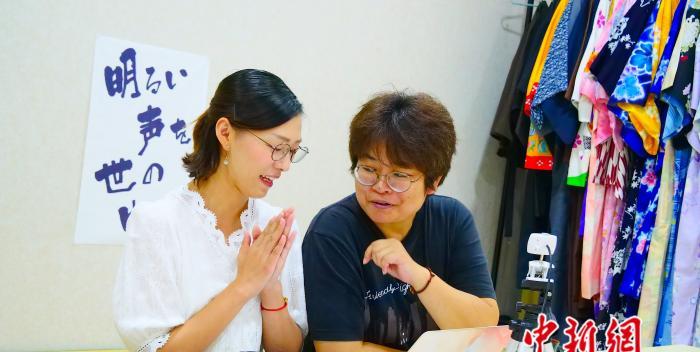China News Service, Beijing, January 21 Title: Japanese teacher Noriko Nakamura: After nearly 20 years in China, how has China become "my hometown"?
China News Service reporter Zhu Chenxi
"For me, China is no longer a 'second home', I am in China like my own hometown." On the occasion of the 50th anniversary of the normalization of diplomatic relations between China and Japan, Noriko Nakamura from Chiba Prefecture, Japan, was recently interviewed by a reporter from China News Agency, telling her about her feelings about working and living as a Japanese language teacher in China.
Noriko Nakamura, 52, now lives in Changsha, Hunan. From teaching Japanese in a university classroom, to starting an online Japanese radio station "Nakamura Radio", to running an online Japanese live class, she has been engaged in Japanese language education in China for nearly 20 years.

The first on the right is Noriko Nakamura, courtesy of the interviewee
In the 1980s, Noriko Nakamura studied Chinese history at Ritsusho University in Japan. She came to China for the first time in 1990 and spent a year studying abroad at the Beijing Chinese College (now Beijing University of Foreign Chinese). After graduating from university, she had a stable job as a teacher in Japan, but a fortuitous incident made her decide to quit her job and come to China.
A Japanese television program at the time said that students at a school in China studied Japanese very hard, but they couldn't find a Japanese foreign teacher. I was thinking, since we are all teaching, why not change a classroom to teach in China? With this in mind, In 2003, Noriko Nakamura left Japan to work at a school in Wuhan to start her career as a foreign teacher in Japanese in China.
In order to make it easier for more people to learn Japanese, in August 2014, Noriko Nakamura, who works at Zhongnan University of Economics and Law, founded the Japanese Internet radio "Nakamura Radio" to read novels, essays, fairy tales and articles written by Japanese writers, and so far the total number of listeners of "Nakamura Radio" on different application platforms has reached 400,000.
"I thought that everyone would not be interested in the reading of an ordinary Japanese person, and I did not expect to receive so much attention." Noriko Nakamura said. Through online interaction, she has also become offline friends with many Chinese.
Many people think that since they are Japanese, it is certainly not necessary to teach Japanese. This is not the case. Noriko Nakamura told reporters that the first thing that bothered her was the tone. As a native of Chiba Prefecture, Japan, she thought that the tone would be fine, but it turned out that her pronunciation was different from the standard tone. For the first three years of teaching Japanese, Noriko Nakamura kept the tonal dictionary at hand to ensure that what she taught was an example.
During the teaching process, Noriko Nakamura also takes into account the language habits of Chinese. Japanese people often put negative words at the end of sentences, "This kind of Japanese is difficult for Chinese to understand, so when I teach, I will break sentences and add continuation words to change the language." In this way, even if the speed of speech is faster, students can understand."
His long-term experience in China has allowed Noriko Nakamura to see the differences between Japan and China, but also to see the commonality. In the cultural exchanges that span thousands of years, Chinese culture has had a profound impact on Japanese culture. When she was in high school, Noriko Nakamura recited the ancient Japanese version of Li Bai's "Yellow Crane Tower Sends Meng Haoran to guangling". In Japanese middle schools, students need to learn a lot of Chinese idioms and ancient Chinese sentences. "Many Chinese may be surprised by this, but this is a very common thing for Japanese people."
Noriko Nakamura does not see cultural differences as troublesome, "I am a very curious person and enjoy the joy of discovering new things." Ingredients like brain flowers and duck heads are resisted by most Japanese people, but she will try them. Because she likes to eat spicy, when she worked in Wuhan, she would even take the high-speed train to Changsha every month for a Meal of Hunan cuisine, which is why she finally chose to settle in Changsha after leaving university.
Nowadays, more and more students like to refer to her as a "hot-blooded Japanese teacher", and Noriko Nakamura has always had another understanding of her identity - a "localized" foreigner. Every Spring Festival, friends invite Noriko Nakamura to experience how Chinese friends and family celebrate the New Year. Last year, she also owned her own house in Changsha.
Affected by the COVID-19 pandemic, Noriko Nakamura has not returned to Japan for more than two years. However, she said: "People in both countries attach great importance to friendship, eat and drink with Chinese friends, and do not feel lonely at all." ”
Hunan Province and Japan's Shiga Prefecture are friendly provinces and counties, and since 2021, the two sides have held online exchange meetings on Weibo many times, and Noriko Nakamura assisted the Shiga Prefecture Hunan Representative Office and Shiga Prefectural Government Staff to participate in these activities. "The online campaign has given local people in the two countries more opportunities to get to know each other." She said.
Over the years, Noriko Nakamura's most frequently asked question is "Why did you stay in China?" Her answer was, "I have seen, heard, and felt a lot of friendliness from Chinese in China, and I am engaged in a profession that I like, and I plan to live in China until I grow old." There are many people in Japan and China who are working hard for each other's friendship, and I believe that the relations between the two countries will definitely become better in the future. (End)
Source: China News Network